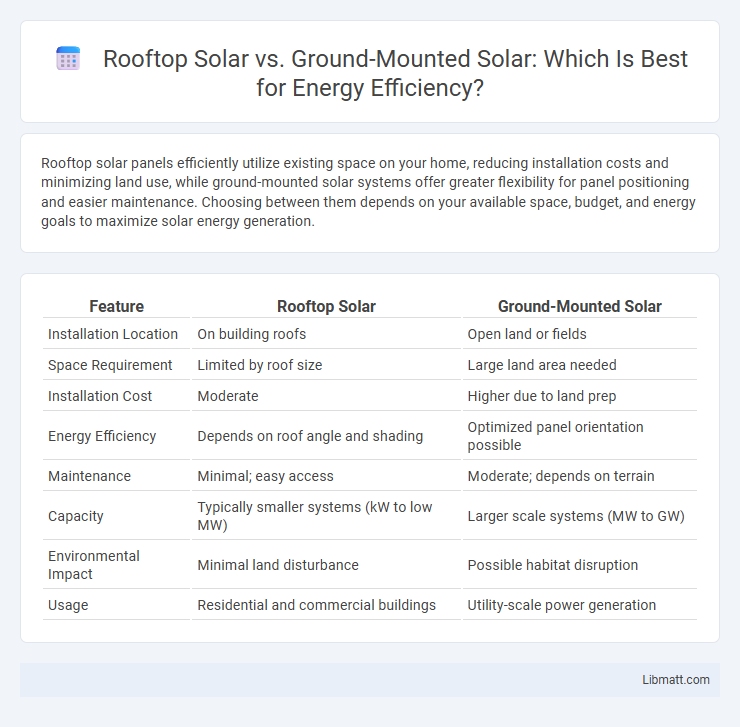Rooftop solar panels efficiently utilize existing space on your home, reducing installation costs and minimizing land use, while ground-mounted solar systems offer greater flexibility for panel positioning and easier maintenance. Choosing between them depends on your available space, budget, and energy goals to maximize solar energy generation.
Table of Comparison
| Feature | Rooftop Solar | Ground-Mounted Solar |
|---|---|---|
| Installation Location | On building roofs | Open land or fields |
| Space Requirement | Limited by roof size | Large land area needed |
| Installation Cost | Moderate | Higher due to land prep |
| Energy Efficiency | Depends on roof angle and shading | Optimized panel orientation possible |
| Maintenance | Minimal; easy access | Moderate; depends on terrain |
| Capacity | Typically smaller systems (kW to low MW) | Larger scale systems (MW to GW) |
| Environmental Impact | Minimal land disturbance | Possible habitat disruption |
| Usage | Residential and commercial buildings | Utility-scale power generation |
Introduction to Rooftop and Ground-Mounted Solar
Rooftop solar systems are installed directly on residential or commercial building roofs, utilizing available rooftop space to generate electricity efficiently. Ground-mounted solar arrays are installed on the ground using racks or poles, offering greater flexibility in size and orientation, ideal for larger-scale projects with ample land. Both technologies convert sunlight into clean, renewable energy but differ in installation methods, space requirements, and potential energy output.
System Design and Installation Differences
Rooftop solar systems utilize existing building structures, requiring customized design to fit roof space, orientation, and load-bearing capacity, making installation more constrained but often quicker and cost-effective. Ground-mounted solar systems allow for flexible layout designs with adjustable tilt and orientation, ideal for maximizing energy output on open land but typically involve more extensive site preparation and higher installation costs. Your choice between these two depends on available space, structural considerations, and budget for system design and installation complexity.
Space and Land Use Considerations
Rooftop solar panels maximize space efficiency by utilizing existing building surfaces, making them ideal for urban areas with limited land availability. Ground-mounted solar systems require significant open land, which can impact agriculture or natural habitats but allow for larger-scale installations and easier maintenance. Selecting between rooftop and ground-mounted solar depends on land availability, project scale, and site-specific zoning regulations.
Cost Comparison: Rooftop vs Ground-Mounted Solar
Rooftop solar installations typically have lower upfront costs due to reduced land preparation and mounting expenses, averaging $15,000 to $25,000 for residential setups. Ground-mounted solar systems often incur higher initial costs between $20,000 and $30,000, influenced by additional labor for land grading, mounting structures, and wiring. Despite higher installation costs, ground-mounted solar panels can achieve better efficiency through optimal positioning and easier maintenance, potentially offsetting the upfront investment over time.
Energy Efficiency and Performance
Rooftop solar panels typically offer higher energy efficiency due to their optimal tilt and orientation aligned with building structures, minimizing energy loss. Ground-mounted solar systems allow for larger panel arrays and easier maintenance, which can result in greater overall energy production despite potential shading or uneven terrain. Comparing performance, rooftop installations maximize space utilization in urban settings, while ground-mounted systems benefit from less obstruction and flexible placement, influencing total energy output based on site-specific conditions.
Maintenance and Accessibility
Rooftop solar systems offer easier routine maintenance due to their proximity and accessibility, minimizing labor costs and inspection time. Ground-mounted solar arrays provide better access for large-scale cleaning and component replacement but may require specialized equipment for maintenance in rugged terrain. Both systems demand regular monitoring to ensure optimal performance, with rooftop installations typically experiencing fewer structural access challenges.
Aesthetic and Visual Impact
Rooftop solar panels offer a sleek, integrated look that maintains your property's aesthetics without requiring extra land, minimizing visual disruption. Ground-mounted solar systems, while often larger and more flexible for optimal sun exposure, can create a noticeable visual impact, potentially affecting landscaping and curb appeal. Choosing rooftop solar generally preserves your property's appearance, making it a preferred option for those prioritizing subtle energy solutions.
Scalability and Expansion Potential
Rooftop solar systems offer limited scalability due to space constraints on your existing structure, making expansion challenging as energy needs grow. Ground-mounted solar installations provide significant flexibility and scalability, allowing for easy addition of panels and adjustments to optimize energy output. This expansion potential makes ground-mounted systems ideal for long-term growth in solar capacity.
Environmental Impact and Sustainability
Rooftop solar panels utilize existing structures, minimizing land use and preserving local ecosystems, while ground-mounted solar installations often require significant land clearing, potentially disrupting habitats and soil integrity. Rooftop systems enhance sustainability by reducing urban heat island effects through shading and promote energy independence without contributing to land degradation. Both options reduce reliance on fossil fuels, but rooftop solar offers a more eco-friendly solution by maximizing space efficiency and minimizing environmental footprint.
Choosing the Best Option for Your Needs
Rooftop solar systems maximize space efficiency by utilizing existing structures, ideal for limited property areas and residential use. Ground-mounted solar panels offer greater flexibility in panel orientation and size, making them suitable for larger-scale installations and commercial properties. Evaluating factors such as available land, installation cost, energy goals, and shading conditions ensures the optimal solar setup tailored to your energy needs.
Rooftop Solar vs Ground-Mounted Solar Infographic

 libmatt.com
libmatt.com